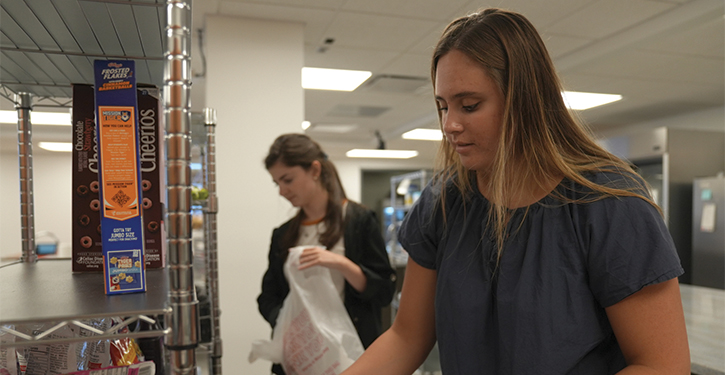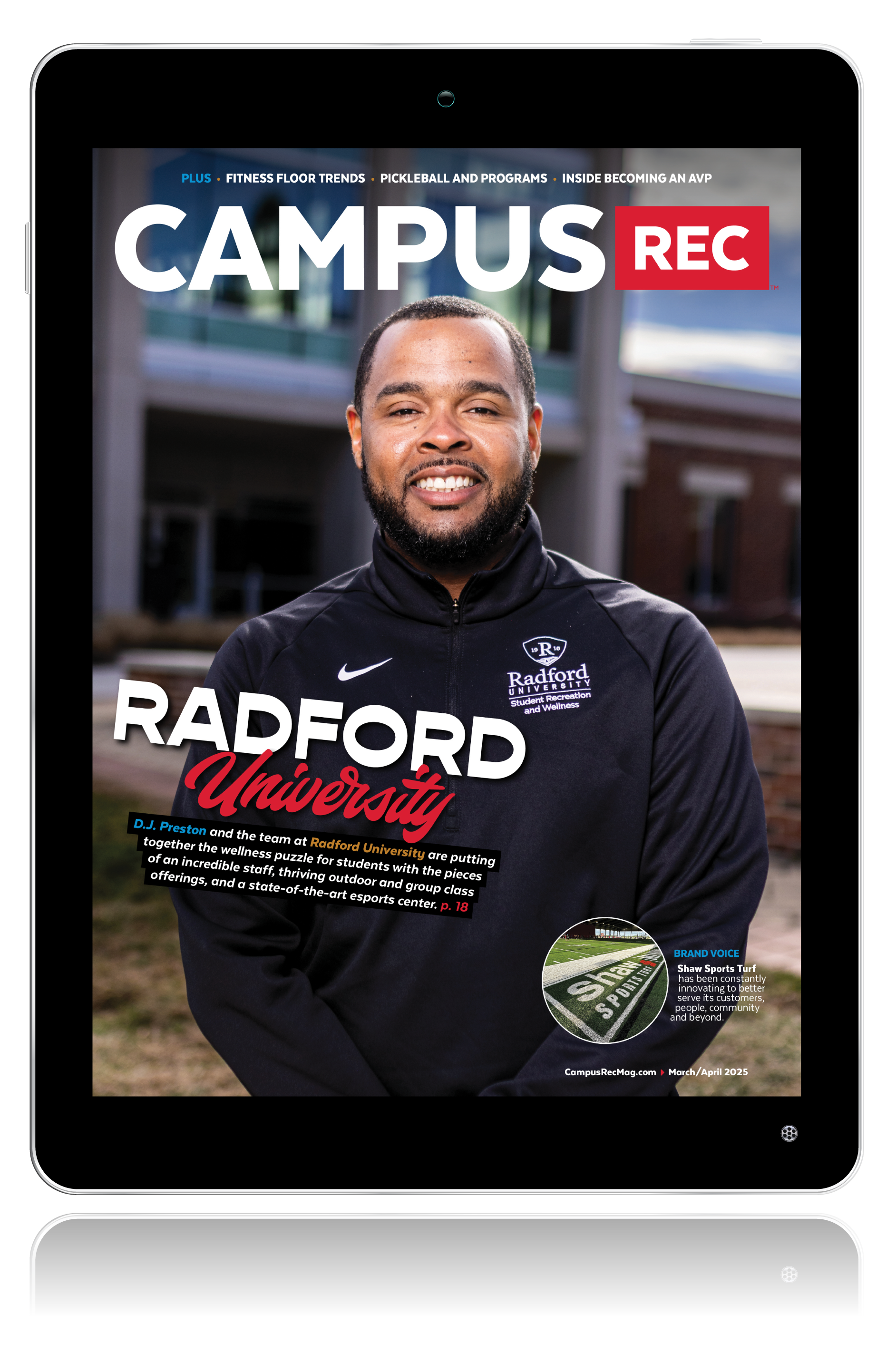For over 10 years, University of Illinois Urbana-Champaign (Illinois) Campus Recreation has hosted cooking classes within the department.
But when it was time to expand the space due to the increasing demand from students, Alana Harris, the associate director of Assessment and Student Wellness, said they received a large amount of feedback asking for food out of the kitchen.
Soon after launching a literature review of the campus and community, Harris said the department’s Food Assistance and Well-Being Program was born.
The program acts as a student food pantry, but the space also hosts:
- Regular cooking classes
- Nutrition coaching appointments
- Meal kit offerings
- A farm share
“We put forward a proposal for the food assistance program in conjunction with several of our other nutrition programs,” said Harris. “The space soon opened, and we exceeded our projected numbers right away. We saw nearly 30 students on a weekly basis. When students returned to campus after the COVID-19 pandemic, we saw exponential growth in the following semesters. In Spring 2022, we saw over 800 shoppers. We’ve only seen growth, which is sad, but it’s rewarding that we are meeting this need.
“It’s a large portfolio of work focused on solving food insecurity,” continued Harris. “Food security is at the front and center as an effort the whole of our campus community is working toward. That’s such a critical part of this. Without the collaborations on campus, we wouldn’t be meeting the specific need a student has.”
EXTRA CREDIT: Meal Kit Mondays at the University of Nebraska-Lincoln are seeing a great response.
Focusing on improving food nourishment on campus is also a point of emphasis at Lehigh University and the University of California, Davis (UC Davis).
In March of 2020, Lehigh hired a registered dietitian to head its new Nutrition Counseling program. At UC Davis, the Healthy Aggies initiative is a student-run group that the LiveWell assistant director and Campus Recreation registered dietitian fund and supervise.
Genna Albano, the assistant manager of Fitness and Instructional Programs at Lehigh, said the new Nutrition Counseling program has created a buzz around campus.
“It’s been great,” said Albano. “With our previous campus dietitian, we were more focused on weight analysis. That wasn’t necessarily what they were asking for. Students were looking for information on making good choices. They were hungry for that education.”
Keri Lasky, the new on-campus dietitian at Lehigh, said the program was rebranded with the phrase “Nourish Your Potential” which garnered attention in the community.
“We provide students, faculty and staff with complimentary, yearly access to comprehensive medical nutrition therapy for a variety of conditions, individualized nutrition counseling services, and fun educational seminars and events,” said Lasky. “Members of the Lehigh community are able to schedule any one of our amazing nutrition services at our online booking link or by reaching out to me personally.”
EXTRA CREDIT: Steven Trotter shares how nutrition is part of the elements of well-being.
Lasky said clients are required to fill out the necessary forms and waivers at least 24 hours before the scheduled appointment, which includes a comprehensive pre-session nutrition questionnaire.
To book appointments, Lasky uses Practice Better, a secure nutrition practice management system, where she can efficiently manage the program as the sole dietitian running the initiative.
“We’ve always partnered with a registered dietitian but never for something this ambitious,” said Albano. “It’s a big undertaking for one person. She has been super enthusiastic. Her appointments have been really filling up on Fridays and are well-attended.”
UC Davis’ Healthy Aggies initiative is also seeing a strong response from the student body. Kayleigh Rohrbach, the assistant director of Living Well, said Healthy Aggies first began as a nutrition education team in Dining Services. Eventually, the program was discontinued before being picked up by Campus Recreation.
Now, a team of senior clinical nutrition students conduct counseling sessions, work at the UC Davis Farmers Market and host informational tables in the Activities and Recreation Center.
Linda Adams, the campus registered dietitian, and Rohrbach train the students on motivational interviewing concepts for nutrition counseling and practice the techniques in weekly meetings.
“The interns run the 60-minute nutrition consultations over Zoom,” said Rohrbach. “Linda attends every consultation until she feels confident the students can conduct it themselves. I advertise the program to students, coordinate the drop-in hours in our facility and co-supervise the student counselors.”\
EXTRA CREDIT: University of California, Riverside Campus Recreation offers the Cooking Well program.
Through the program, Rohrbach said the counselors can also refer students to valuable resources that exist on campus. She said many students are concerned they are not consuming enough protein. So, the Healthy Aggies use dietary guidelines and MyPlate education materials from the U.S. Department of Agriculture to help students visualize the balance of the macronutrients.
“It benefits the campus as a whole by offering free nutrition consultation services to students, faculty and staff where they would otherwise not have access to this resource,” said Rohrbach. “In general, we see what students are asking about change as the trends around nutrition on TikTok, Instagram and other social media sites change. We work with the counselors to ensure they have the correct information to debunk many trending topics.”
Regardless of the type of nutrition initiative, Harris said it would not be successful without strong partnerships. That’s one reason why she said the Illinois student food pantry continues to have success.
“We get our food through the Eastern Illinois Food Bank,” said Harris. “We are a local branch of that food pantry to ensure we keep a not-for-profit status. And we rely very heavily on donors to sustain the space. There is a stigma around accessing a food pantry, but there is a real sense of community here. The next frontier for campus recreation professionals is realizing we are more than a gym — we are a community center.”
Overall, there are many ways for campus recreation departments to improve food insecurity on campus from food pantries to using registered dietitians. Despite the different avenues, these programs showcase nutrition is an essential piece of advancing student well-being.











